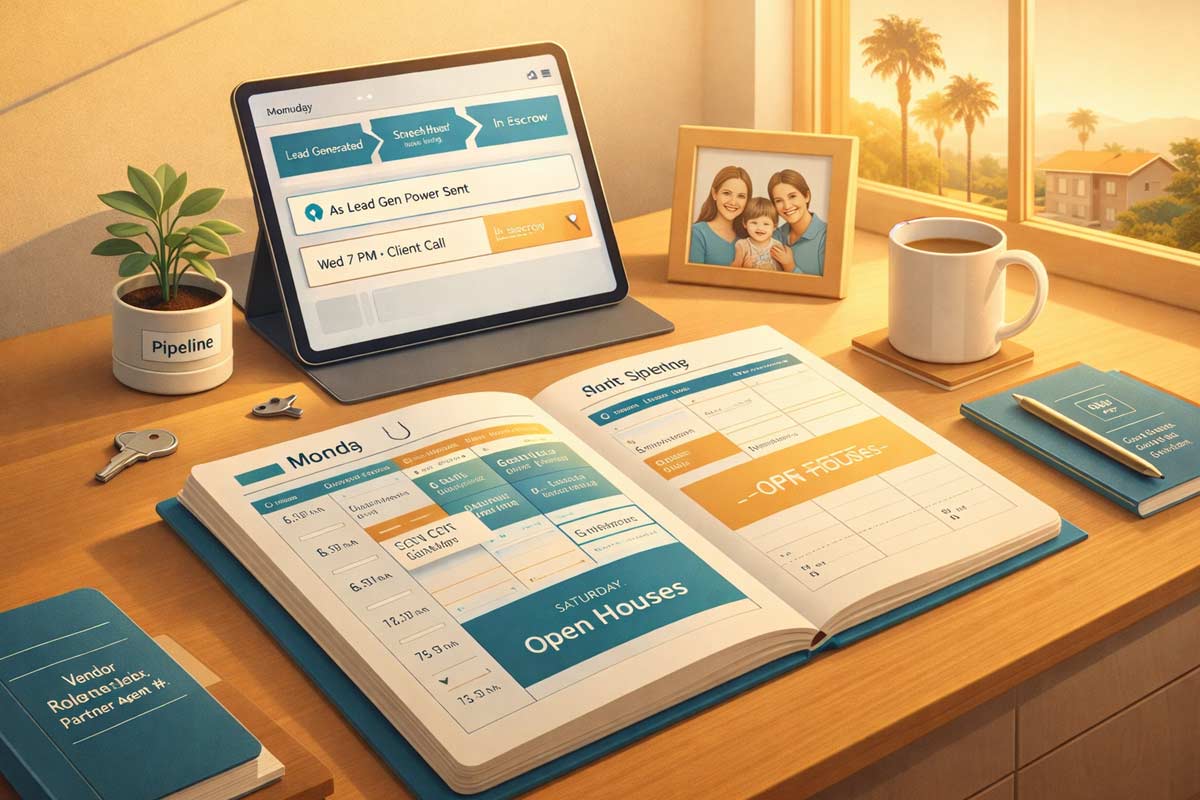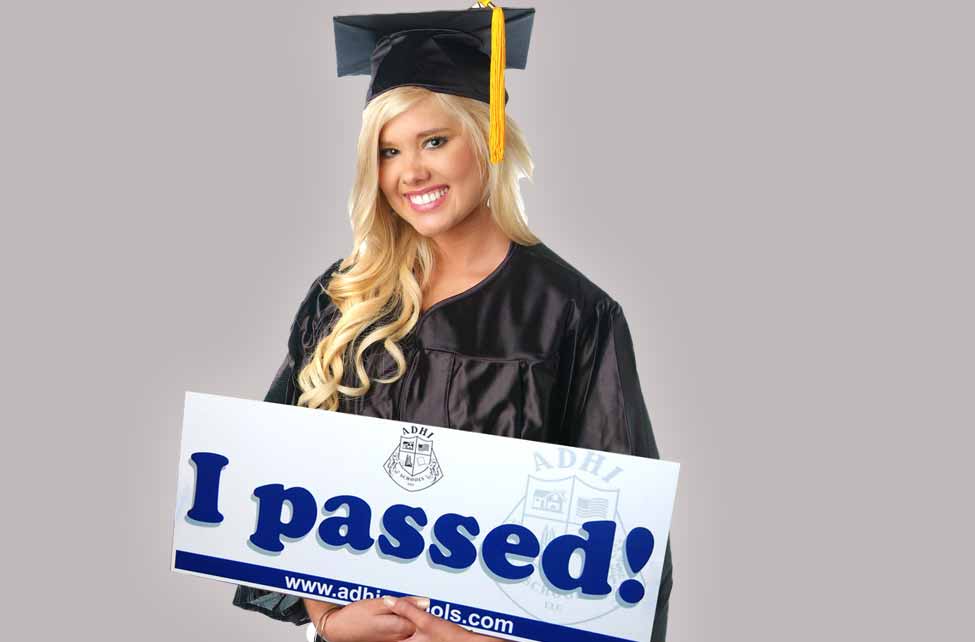
Most people think that in order to become a great Realtor we need to be good at showing and selling property," we tell ourselves. "What more is there?”
In reality, it turns out there's quite a bit Read more...
Most people think that in order to become a great Realtor we need to be good at showing and selling property," we tell ourselves. "What more is there?”
In reality, it turns out there's quite a bit beyond that.
If you’re interested in obtaining your real estate license and become a full-fledged Realtor, it’s probably useful to learn a little bit more about what someone in that role actually does daily.
Once you finish our real estate license school and head out into the real world, you'll find that the daily responsibilities of a real estate agent are actually a lot more involved than you might think. Not in a bad way — but in a way that you should be familiar with before you begin those early days of your career.
The Life of a Real Estate Agent: Breaking Things Down
One of the most important daily responsibilities of any real estate agent actually has little to do with "selling houses" at all. Broadly, you need to be excellent at providing customer service to a wide range of people in a myriad of different situations.
Be The Calm in the Storm
Think about it like this: Buying a home is one of the most important moments in a person's life, particularly if it's the first time they're doing it. So it's an inherently stressful experience and one where people will be looking for an expert to guide them. The best real estate agents understand that they are the calming force in any transaction. You need to be able to provide people with the information they need to make the best decisions possible and you need to do so in a way that simultaneously instills confidence.
It's a lesson you'll begin to learn in our real estate license school but that you'll have to perfect over time on the job.
Understanding Contracts and Paperwork
Another major daily activity of a busy Realtor involves drafting and preparing things like offers and other types of paperwork. This requires a deep understanding of not only the laws and regulations in your particular market, but also the needs and requirements of the people you're actually working with. Remember that as an agent, you are someone else's advocate — they're trusting you to bring a level of experience to the deal that they themselves do not possess. To get to that point, you need to not only be aware of HOW to handle the paperwork that comes with buying and selling real estate, but organized enough to do so in the right way.
That customer service element also intersects with the marketing side of the business — only instead of selling a property, you're really selling your most valuable asset of all: yourself and your abilities.
Similarly, the busy real estate agents spend a majority of their day getting, obtaining and servicing listings in their marketplace. Most of the time, this is done by pouring over the Multiple Listing Service database, otherwise known as the MLS. Most MLS databases are logical but sometimes they are not so intuitive. Only through practice running a variety of different searches can proficiency be obtained.
For example, how do you search for a single-story home, with a spa but no pool in a specific school district below $750 per square foot? This search will take the expert Realtor 1-2 minutes, whereas for a rookie this same search might take 10-15 minutes. Like most things - practice makes perfect.
If someone says to you, "I like this house we're looking at, but it would be better if it had X, Y and Z qualities," you should immediately be thinking of other properties you can show them. You can't do that without putting in the time to research what those listings actually are. Working with the MLS is a crucial part of the daily life of a real estate agent.
Don’t forget to prospect
Most importantly, a real estate agent spends an incredible amount of time collecting leads from other sources, too — either via word of mouth from past satisfied customers or from referrals in the industry. Hitting the phones or door knocking can also be a great way to get a hot tip on a property before it actually gets on the market- especially if it's one that you know would be perfect for one particular client.
That aspect alone can quickly become an omnipresent part of the job — something that you should have at the very least in the back of your mind all day, every day. It's part and parcel for what a real estate agent actually does and, in truth, that rush of getting the jump on your competitors is a large part of why people love the profession in the first place.
Get Comfortable Being Out and About
Of course, a lot of your days will also be spent showing properties which is the aspect of the job that anyone who has ever purchased a home is most familiar with. But again, it's just one small part of a much larger story. Getting your start in real estate comes with the understanding that it's more of a far-reaching profession than most expect.
The great real estate agent is part therapist, part negotiator and available to answer any questions that their clients may have.
Hoping this helps. I’m always looking to bring value to our readers. If I can help you, please reach out on Instagram @kartikspics or call the office at 888 768 5285.
Love,
Kartik
|

Frankly, Instagram has brought us a ton of new students. So many of our students enroll because they have seen social media posts from agents about how much money they make. Programs like Million Dollar Read more...
Frankly, Instagram has brought us a ton of new students. So many of our students enroll because they have seen social media posts from agents about how much money they make. Programs like Million Dollar Listing have contributed to this perception.
While some of these stories are true and many agents do make a lot of money in our business, I wanted to write a quick article about things you should know before starting a career in real estate. I wrote a few pieces of advice - I thought the title was catchy - before anyone takes the first step in entering our business.
You Are the Boss
It may seem obvious, but people who have spent the majority of their lives working for a manager or supervisor are often surprised by how much discretion they have over their daily schedule. There aren’t any wake up calls in our business. No one complains if you show up 5 minutes late - or don’t show up at all. Worse yet, if you work for a “virtual brokerage” there might not be a person available to bounce ideas off of or to get advice from when you find yourself in a rut. When a decision needs to be made, you are often the person who has to be decisive and take action.
You Need a Business Plan
Being a self-employed person means that you need to come up with a business plan that provides a roadmap for your real estate business. How much money are you setting aside for marketing and advertising? How many transactions do you plan to close in a month, or in a year? Does your business plan call for you to work from a real estate office or work from home? How much time are you setting aside for your business if this is part-time work?
In addition, you also need to understand your tax obligations. You will have to pay quarterly taxes and budget for this. You'll need to track your business income and deductions to ensure you pay enough every year. Most agents have a CPA or other tax advisor that they lean on regularly for this.
It’s Useful To Have a Cash Reserve
What social media posts and television rarely show are the slow periods. There will be a time when you don’t close anything and your pipeline isn’t progressing as quickly as you would like. This period can especially hold true for the brand new licensee that will have a minimum 90-day window to get a handle around the business. Always have at least a small cash reserve built up before starting, and keep adding to it little by little. By having a nest egg, you'll be able to weather slow periods and continue to build until you are at the point where you have a steady pipeline of closings.
Your Schedule is Flexible... Sort Of
It's true that you can work whenever you want. So if you are a night person who loves working at 2am because it is quiet and calm, you can do all your paperwork and get your online marketing accomplished during those hours. On the other hand, remember that you will have clients that can and will contact you at unpredictable times. A certain property may show up that a client wants to see right away and that showing may not have been “in your schedule” but you may feel the need to drop everything and pivot.
If you become a residential real estate professional you will likely have clients that work 9-to-5 jobs. The only times they have to look at a house or arrange for a showing are evenings and on the weekends. Are you accounting for this in your plan?
Somehow Differentiate Yourself from the Rest of the Pack
You have a real estate license. That is an accomplishment not to be undermined. Remember, however, that you were in a full classroom of other people who also obtained their licenses. They’ll likely be working in the same neighborhoods as you. Additionally, you will also be competing against established, veteran Realtors which will be an even more competitive field.
Establishing your personal brand and differentiating yourself is absolutely mission critical. Figure out what makes you unique, whether it is your marketing skills, market knowledge, or negotiating techniques. Then let people know about your skills so that they each out to you first.
Start Your Real Estate Career Today
Are you ready to make the move into real estate and gain the education you need to succeed? Visit our website to learn about how you can gain your license and start this exciting career.
Side note - My intention with this article is not to discourage anyone from starting in our business. It’s simply to pepper a little bit of realism in the basket of fake Instagram and YouTube videos. I have many students that make into the 6 and 7 figures annually. It is possible, but everyone is looking for the secret sauce that’s going to make them successful.
The truth is that there is no secret - it’s just hard work.
Love,
Kartik
|

The Dream vs. The Delivery: A Reality Check
The "Real Estate Dream" is often sold as a low-risk side hustle. The pitch is enticing: get your license, work a few weekends, and pocket $15,000 commissions Read more...
The Dream vs. The Delivery: A Reality Check
The "Real Estate Dream" is often sold as a low-risk side hustle. The pitch is enticing: get your license, work a few weekends, and pocket $15,000 commissions while keeping your 9-to-5 safety net.
Here’s the truth I’ve seen after coaching thousands of students at ADHI Schools:
Real estate is a professional service, not a hobby.
The market rewards speed, availability, and consistency. Your current employer, however, also demands your focus. To bridge this gap, you don't need more "motivation"—you need a system.
Before you commit your time and money, you need to ask the fundamental question: Should You Become a Real Estate Agent in California? Success in part-time real estate only works if you can systemize around three specific conflicts:
Time, Responsiveness, and Lead Flow.
TL;DR: The Binary Decision
GO if: You have 15+ hours a week, a flexible day job for emergencies, and a 6-month financial cushion.
NO if: You cannot take calls during the day, have zero weekend availability, or need a commission check within 90 days to pay rent.
The Three Conflicts of Part-Time Real Estate
|

Obtaining a real estate license after passing the real estate exam is only the beginning of your career in our great real estate business. The next step (and in many ways the more important piece of the Read more...
Obtaining a real estate license after passing the real estate exam is only the beginning of your career in our great real estate business. The next step (and in many ways the more important piece of the puzzle) is to prospect for clients.
The high level question the must be asked and answered by the new agent is: What does a buyer or seller want in their Realtor? And next - How do I meet those needs?
Simply put - buyers and sellers are looking for a local real estate expert. Buyers want someone who knows what local restaurants are great, where the nightlife is, what schools are perfect for their kids, and what amenities are popular in the neighborhood.
Sellers, on the other hand, want a local Realtor who knows what the current and future market outlook is, what the comparable sales look like for the house when compared to other similar properties on the market, and at what price to market the home.
So how do you become a local real estate expert for your clients? Here are several strategies to implement once you finish your real estate courses and become a Realtor.
Go to Local Government Meetings and Chamber of Commerce Events
Government meetings and chamber of commerce events will play important factors on how you grow your business and connect to community members. You'll want to pay attention to any changes, regulations or votes coming up with the city council or planning commission that will impact the local real estate market. These meetings could discuss zoning regulations or upcoming development projects, for example. Information gathered at this event can allow you to better track the market and inform clients of developments that can affect the home buying or selling process.
I remember one friend of mine who was showing a high-rise condo to a buyer on Wilshire Boulevard in Los Angeles. The buyer found a home online that he wanted to see and reached out to the agent for a showing. Directly across the street was an empty parking lot that was in the early stages of being the site for a new high rise development. If approved, the new structure would have completely obscured the southern view from the living room and bedroom and would have also casted a dull shadow over the pool deck. The fact that the agent was plugged into the local planning commission and had actually attended some of the Homeowner Association meetings meant that he was in the know and ultimately able to advise the buyer on the proposed development. Surely a large building blocking your view that breaks ground shortly after the close of escrow would be a nightmare scenario for the uninformed buyer.
At chamber of commerce events, you can network with other businesses. You can learn about the roles these employers have in the community, and can share this information with buyers. It’ll also be a great chance to meet other entrepreneurs and refer business to one another.
Get Involved in Social Events and the Community
Prospective clients like to see that real estate agents are getting positively involved in local events. Whether it is partnering up with a local blood drive or volunteering time at an animal shelter, these tactics show that you want to invest your time and work in building a strong and welcoming community.
Also, attend social events such as festivals and get to know people. Shake hands with organizers and speak with the local residents. People will remember your friendly demeanor at the event as they will be inclined to speak positively about your real estate business with others.
There’s nothing wrong with telling people that you are in the process of obtaining your real estate license now and start building those relationships early. Of course, you won’t be able to do anything that would require a real estate license, but there aren’t any laws against getting to know people in the area.
Show You Are an Expert in Emails, Social Media and Personal Interactions
After taking real estate classes Los Angeles, you've gained the knowledge to help people with their real estate dreams. Yet you also have to show them that you are a local expert. You can do this through your correspondence, social media accounts and interactions with clients.
Once you get your license, you’ll need to define the areas where you’ll want to build your real estate practice. Study the properties in those areas and the overall market on sites like www.dqnews.com and in the Multiple Listing Service. Over time, you’ll get to know the types of properties in those areas, the number of certain residential properties (single-family homes, duplexes, and multi-family structures). Also, you've gathered the data about recent home transactions, buyer trends, and average sales prices. Take all of this data and pepper it throughout your emails, newsletters and social media sites.
Drop in facts that will draw in a person's interest and convince them to take the next step in calling for your services. You want to impress them with the market insights that you've gathered as they will feel confident about your skills. In addition, you want to do the same at face-to-face meetings and appointments with clients. Showing people that you've done all the real estate homework will allow you to gain repeat business and positive reviews that will help your career.
By immersing yourself in community events, attending government meetings, and sharing your local expertise through social and other media, you can solidify your position as a top real estate expert in the local market. It’ll be easier to convert leads into real estate transactions by showing your in-depth knowledge about local market trends.
As always, please call my office at 888 768 5285 or visit our website for information on real estate classes online or in the classroom. If you are getting ready to prep for the real estate exam and you need a real estate crash course click here.
Always looking to bring you value.
Love,
Kartik
|

Are you thinking about enrolling in real estate license courses? If so, your first thought may be whether or not now is a good time to start.
How’s the market doing?
A career in real estate can Read more...
Are you thinking about enrolling in real estate license courses? If so, your first thought may be whether or not now is a good time to start.
How’s the market doing?
A career in real estate can be very rewarding and it all starts with the right real estate school. The U.S. Department of Labor reports the demand for real estate agents and brokers will grow by 7 percent from 2018 through 2028, a rate that’s faster than average for all job growth.
Demand is out there for well-qualified, dedicated agents willing to learn the industry from the ground up.
Should You Enter a Career in Real Estate?
Timing Is Everything
Those wondering if they should become a REALTOR often ask themselves whether now is the right time based on market conditions. The short answer is that while your initial timing can matter remember that getting your license now can open the door for years, no matter how the market swings in the short term.
Here are some answers to common questions:
#1: What Is the Market Like?
The real estate market grows and expands on a consistent basis. There are times when market activity can and does cool like back in 2008 and 2009. However, the current market remains robust with the possibility of ongoing appreciation.
Put that aside for one moment, though. Remember that people are always buying and selling real estate no matter what the market does. Keep in mind that there are always consumers looking for their first home or to downsize after the kids move out. There are always new developments and opportunities. In other words, there is always the need for a qualified real estate agent.
#2: But Is The Economy Slipping?
While there are valid concerns over how long the economy will continue to grow at its current rate remember that transactions happen in all economic conditions. More so, many people move into real estate investing when the stock or other markets begins to decline. I talked briefly about this in an earlier article.
That’s because real estate is viewed as a safer and more tangible investment for some. This also creates opportunities for individuals looking to grow their career.
#3: Are Houses Selling Today?
The answer here is “yes” as well. More so, in the long term, there will be an even higher demand for homes. I don’t think anyone believes that the population is going to decrease throughout the United States any time soon.
The current economic climate has helped push home values high. A combination of low interest rates and high demand have sent prices soaring in many areas.
In some areas, they are simply out of reach for some buyers. As home prices begin to slow their rate of growth, they will become in reach for more consumers, especially those looking to buy their first home. Homes are selling and will continue to sell.
Starting a Career in Real Estate - Is It Right for You?
People will always be buying and selling homes. Demand will ebb and flow. Real estate agents committed to providing a high quality of service to their clients will continue to see significant demand for their services. Your buyers be might everyday consumers looking for their first home as home prices fall. Or, you may be able to work hand-in-hand with investors who are looking for good deals. Real estate classes help you prepare for every market condition, too.
If you:
• Enjoy real estate and looking at homes and buildings
• Love helping people
• Like to negotiate
• Want the flexibility of working on your own schedule
• Want unlimited income potential
A career in real estate could be right for you. You can meet the California real estate license requirements though our real estate school in as little as 54 days and start taking advantage of the current market climate. Once you establish yourself, there’s no telling how the market will work in your favor.
A shameless plug, ADHI Schools is the number one real estate school in California. We can walk you through the pros and cons of being a real estate agent.
Call us at 888 768 5285 or visit adhischools.com to pass your real estate exam the first time.
Love,
Kartik
|

Once you complete our classroom real estate courses in California or real estate classes online, you’ll need to put your license with a broker if you want to go to work.
At this early stage in your Read more...
Once you complete our classroom real estate courses in California or real estate classes online, you’ll need to put your license with a broker if you want to go to work.
At this early stage in your career, you are probably full of enthusiasm and at the same time have some serious questions and perhaps some lingering fears about whether not you're making the right career decision.
One of the most important steps you will take as a real estate salesperson is to choose a broker, the place where you will, in effect, hang your hat along with your license, and build your initial reputation in the field. Whether you're already licensed, or are shopping for a place to take your real estate classes, finding the right environment is all-important to your future. Even though it's not a lifetime commitment, your choice of initial affiliation will affect not only your earning ability, but also your learning curve, your growth potential as a real estate agent, and your long-term success and fulfillment as a professional.
Brokers also want to ensure that new agents who join their firms will be compatible, hard-working, knowledgeable, committed, enthusiastic, and a good match for the company culture.
How should you evaluate your opportunities? What are the steps to take to assure the best possible fit?
To prepare for your interview, expect to be asked the following questions by a potential employing broker:
1. What drives your decision to become a licensed real estate agent?
Do you have previous sales experience? Is money your primary goal? How do you intend to support yourself until the sales (and closings) start rolling in?
2. Do you have a monetary goal in mind?
If you've given even a little thought to this, you will probably answer this question with a specific dollar figure; then you can go on to explain that you intend to grow your earnings over time to reach your ultimate goal. Also, you'd be wise to impress a potential broker with your knowledge of real estate facts and figures. It's not detrimental to disclose that, in the beginning, you view real estate as a part-time gig, until you can build a reputation and a clientele. This disclosure is important because it will help to understand whether or not the brokerage’s training calendar is going to be a fit.
3. How much time and energy can you devote to the business?
Real estate, unlike a 9-5 job, requires evening and weekend work, coupled with high levels of client accessibility. A broker will want to know that you understand the time commitment, as well as the energy it takes to see a transaction from listing to closing, or from initial contact with prospective buyer to the accepted offer by the seller and the escrow ultimately closing.
Real estate can be an extremely rewarding -- and profitable -- profession. But it requires knowledge, dedication and commitment. Show a broker those three qualities, and you'll be on your way to a mutually beneficial association.
If you need help being placed with a broker or are considering the first steps to real estate licensing or passing the real estate exam, call us at 888 768 5285.
Love,
Kartik
|

Recently, I’ve been getting many questions regarding “off-the-top” fees that real estate companies charge their agents.
If you are working at a real estate company, you are probably subject to Read more...
Recently, I’ve been getting many questions regarding “off-the-top” fees that real estate companies charge their agents.
If you are working at a real estate company, you are probably subject to some kind of commission split between you and the company. Imagine it's 60/40, 70/30, 80/20 - whatever it is you'll have some split with your broker. This means that you will get a portion of the real estate commission and your brokerage gets a portion of the commission.
Generally if you go work for a massive franchise like Century 21, Coldwell Banker, RE/MAX or Keller Williams, they are also going to have an “off-the-top” fee. Remember, this is in addition to your commission split.
Typically, this is anywhere between three and eight percent of the total commission. This represents a royalty to the franchisor. So Keller Williams corporate in Austin, or Coldwell Banker corporate in New Jersey gets a portion of your commission before you do.
.
As an example, let’s say you earn a $10,000 commission and your company charges a 6% off-the-top fee. Before your commission split is calculated the company will take $600 out of the $10,000 and send that to Coldwell Banker in New Jersey.
Now you have $9,400 left. Your commission split will be calculated on that $9,400.
Once you finish taking real estate classes, you are naturally going to interview with various real estate brokers and an important question to ask is “What’s my commission split?”
However, you’ll also want to ask if there are there any other fees that are deducted before the commission split is calculated. Some brokers will charge an errors and omissions insurance fee for professional liability insurance. Some brokers will charge you a document scanning fee, or some other “desk fees” to work there.
As a newer agent these are questions that you need to ask of the broker and be as educated as possible so you are fully aware of what you're getting into.
If you are interested in taking real estate classes in Los Angeles or Orange County, please visit our website.
If we haven’t yet connected on Instagram I would love to get to know you - I’m @kartikspics.
Love,
Kartik
|

How to Choose a Real Estate School
I know that many of you who are considering our real estate school are also cross-shopping — as you should. During this decision process, you're going to look Read more...
How to Choose a Real Estate School
I know that many of you who are considering our real estate school are also cross-shopping — as you should. During this decision process, you're going to look at our program and stack it up against other real estate schools, community colleges and online schools. This makes sense, because smart shoppers do their homework.This is why I want to take a moment to explain why our program might be a good fit for you.
The Numbers Speak for Themselves
First off, you should compare our pass rate for the real estate exam with the current statewide statistics. In a recent month, there were 3,987 people who scheduled to take the real estate exam. Out of those scheduled, 3,494 showed up. Of the 3,494 that took the exam, only 46 percent passed that month.As a potential real estate agent, it’s very important to align yourself with an education program that has a proven system to give you the greatest chance of passing the exam - the first time!
Why Does Our Program Work?
I chalk it up the overall process of our entire program. We're going to provide you with excellent support, flexibility on when and how to take classes, a great faculty and solid course materials.
• Full-time support: Our knowledgeable and friendly staff is available five days a week, Monday to Friday. Our representatives are all professional and highly trained. Compare this with smaller real estate schools that simply don’t have the resources that we do.
• Flexible locations: We have many brick and mortar locations if you want to do the classes with a classroom component. This definitely plays into the convenience factor when you're trying to find a school near your home. Here's the best part about it: You get unlimited access to any of these locations' classrooms for twelve months! So, if you need a place close to your friend's house or dentist's office, we have your back. We also have online classes too if your schedule is more scattered.
• Great online real estate classes: No other online school in California has the amount of video that we do. These aren't amateur videos either, but instead are done with professional lighting and audio and great camerawork to ensure you have the most professional set of real estate materials available.
• High-quality instructors: Our faculty is simple the best out there. All of our instructors are extremely professional and knowledgeable. Some of our teachers have been presidents of large real estate organizations. One was even the VP of the global MLS. Another has done over 700 short sales and foreclosure transactions during his career. These are not isolated cases, each one of our instructors is screened for their teaching ability and personality before we hire them.
• The right course material: When you take classes with us, you'll get three tangible college-level textbooks, not just PDFs. You get that "real school" feel by having a solid book in your hands. These textbooks contain hundreds of practice questions to help prepare you for the real estate exam.
• Convenient (and affordable) crash courses: Start out with a bang! Our upper-tier packages also include an intense (and fun) two-day live crash course. This is going to give you the skills and knowledge needed to pass the real estate exam - the first time!
Try It Before You Buy
Naturally, you don't want to commit to something before you have a chance to try it out. That's why I'd like to offer you a free guest pass. With this pass, you can visit any location of ADHI schools at no cost or obligation.To sign up for a physical classroom guest pass, go to the main part of our website, scroll down and then enter your email in the information box. We will immediately send you a guest pass. Come hang out with us! We would be excited to have you in the classroom! If you can't come in person, you're welcome to try out one of our online classes. Sign up for a trial account of our online real estate school. Scroll to the bottom of the page and check it out!
Shop Smart
I highly encourage you to compare our programs side by side with other real estate schools that you might be considering. I'm confident that you'll find that we have much more to offer than the competition.At the end of the day, you need to make the right decision for you. However, I think you'll be very happy if you choose us. Check out ADHI Schools today!
- Kartik
|

If you want to become a real estate agent in California you’ll need to get a real estate license -shocker! The requirements are pretty simple and straightforward. The most basic is that you have to be Read more...
If you want to become a real estate agent in California you’ll need to get a real estate license -shocker! The requirements are pretty simple and straightforward. The most basic is that you have to be at least 18 years old and must complete three college level courses in real estate.
Getting licensed is the first step - If you want to work in the real estate industry you will eventually have to place your license with a real estate broker who will act as your “responsible broker”.
Before you can start working, however, there are some additional requirements which include taking and passing the real estate license exam and obtaining your real estate license, and clearing criminal background. Once you complete these steps, you’re eligible to be licensed to work as a real estate agent in California. Depending on state processing timeframes this process can take approximately five to six months from start to finish.
As a student in our real estate license school, you should understand there are some fees associated with obtaining your license. The good news is you don’t have to pay them allat once as the costs can be spread out over the course of several months. Here’s a quick rundown:
1. 135-hour pre-license course [3 college level classes in real estate]
In order to take the real estate exam, you’ll have to complete three college level courses in real estate. The classes are Real Estate Principles, Real Estate Practice, and an elective that you would choose from a list of possible courses. ADHI Schools offers a variety of choices from Real Estate Appraisal, Property Management and Escrows among others.
While these courses could be completed at a community college my recommendation is that you complete these at a private real estate school like ADHI Schools. The classes can generally be finished faster and our textbooks are included with one low price. How you choose a real estate school is an important decision that should be taken seriously.
We also offer optional-to-attend study sessions over Zoom and in-person real estate crash courses to prep you for the actual state board exam. Our programs also offer hundredsof practice questions so you are ready on test day! Our premiere package including the crash course is just $499.
2. State exam fee
The fee for the sales license exam is $100 and is payable directly to the state. There are small fees paid to the state if you need to reschedule your test.
3. Livescan fee
Everyone seeking to operate as a California real estate agent must submit their fingerprints through DOJ's Live Scan Program. If you are a California resident, you’ll pay a $49 fingerprint processing fee, along with a $30 fee if you have ADHI Schools perform the Livescan.
Once the fingerprint scan is submitted and fee is paid, your fingerprints are sent to the U.S. Department of Justice and the Federal Bureau of Investigation. The DRE will review the background and issue your license or reach out to you for more information.
4. License application fee
Once the above steps are completed, all that’s left is the license application fee, which is $350 in California to obtain a real estate salesperson license. The DRE requires a license to be renewed every four years, which costs $350.
5. Future expenses
Accompanying the $350 fee due every four years for renewal, the DRE requires licensees to complete 45 hours of approved continuing education courses This includes courses that cover Ethics, Agency, Fair Housing, Trust Fund Handling, Risk Management, and Management and Supervision. Licensees must also take approved courses related to consumer protection. Continuing education must be done prior to renewal. These costs are trivial and the class are also super affordable.
This breakdown should help you factor these and future costs associated with your decision to enter our great real estate industry. Essentially, your startup costs to become a licensed real estate agent in California will only be a few hundred dollars making this a very affordable career choice - especially considering you can immediately get to work without having to go through years of college.
If you are interested in learning more about getting your real estate license, reach out to us by phone at 888 768 5285 or visit our website here.
One word of caution - please make sure that you are reviewing the DRE and our own website for the latest exam and license fees.
Love,
Kartik
|

FOLLOW UP IN SALES
If you have ever sold anything, you know that it’s extremely rare that a sale is made on the first contact. Even for something as benign as a shirt or bag, the customer Read more...
FOLLOW UP IN SALES
If you have ever sold anything, you know that it’s extremely rare that a sale is made on the first contact. Even for something as benign as a shirt or bag, the customer may need to come back to the store or review the item online a few more times before committing to the purchase. Before you enroll in a real estate school, it's important to be aware that real estate sales is just that - sales. Follow up is probably the most important aspect of the sales business.
Much of the time, it will take at least 3-4 contacts before your customer signs. In the case of real estate sales, it might take even more contacts as the sales cycle can be longer given the transaction size.
Even though this is a fact of business, most sales people don’t follow up nearly enough or as hard as they should.Reaching out to customers after an initial contact makes several positive impressions at once.
Here are just a few of them.
Follow-up and follow-through show your client:
• You're trustworthy.
• You're available.
• You care about their experience.
• You think they're special.
Mastering the art of the follow-up helps you become a more successful salesperson.
• You learn what the customer expects or wants.
• You give a customer the chance to be heard.
• You can convert a contact into a lead.
• You make the contact more inclined to work with you over other agents.
• You stay fresh in the customer's mind. Even if they're not ready to buy/sell right now, they may be later.
With so many benefits, you should definitely pursue following up as a key prospecting strategy to help you nurture leads and build more business.
How Many Times?
Statistics about agents who followed up more frequently versus those who didn’t are staggering. A recent report shows that agents who follow up on their leads five or more times made at least $200,000 per year. Those who followed up less frequently, even three times, reported significantly less earnings.To many of you, three times seems like a lot already, but it looks like five times is the magic number. Real estate depends on many tenacious sales tactics like this one. If you need to overcome the fear of prospecting, remember that the sale is made in the follow through, not in the initial contact.
The Nature of an Effective Follow-Up
If you're not following up with customers, you're setting yourself up to fail. The real estate game is all about gaining new prospects and leads. As such, you must constantly build your sphere of influence, your pipeline and ultimately gain the trust of new people.But before you pick up the phone or hop on the computer, you should take some time to review the best practices of a follow-up. It's more than just randomly calling people you meet. You need to contact people intentionally.
• First, have the right attitude. Sit up straight and exude confidence in your body language and voice. Your customers can sense if you're not sure about what you're selling.
• Follow up with hot leads first. These are the people who are most likely to become clients. You will get a higher success rate when you prioritize hot leads. Plus it’s easier to build your confidence with warm and hot leads rather than “leads” that are unlikely to buy.
◦ Segmenting your contacts is a valuable habit that will help you determine which contacts are more likely to lead to a sale — and therefore more worth your prospecting hours. Try cutting your prospects into groups of “hot” “warm” and “cold”. You must define what “hot” “warm” and “cold” mean. To me, a hot lead is one that will sign a contract in the next five to seven days.
◦ Follow up with a new lead within the first day.
◦ A hot lead should be reached every day
◦ Contact cold leads on a less frequent basis, between monthly and annually, depending on the nature of their real estate needs.
Hit multiple channels
Some people prefer one kind of contact method over the other, so being present on multiple channels can do wonders in reaching them. Here are a few to try:
◦ Phone calls
◦ Emails
◦ Text messages
◦ Social media DMs
◦ Event invites
◦ Direct mail postcards (check farming.cards as a valuable tool).
Vary your approach
You can make direct calls some days or use softer marketing techniques at other times. Sometimes offering informational content reaches leads without seeming too "salesy," such as sharing home-buying tips on a blog or advice on HVAC repair in a video.
Learn Real Estate Marketing and More at ADHI Schools
This is just the tip of the iceberg when it comes to a great real estate marketing strategy. When you take our online real estate classes, you'll learn the ins and outs about becoming a great agent who can nurture great client relationships. Follow up is a critical part of that.
-Kartik
|









